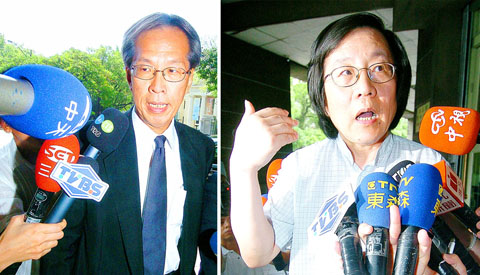Former president Chen Shui-bian’s (陳水扁) campaign finance manager Huang Wei-sheng (黃維生), family doctor Huang Fang-yen (黃芳彥) and former vice premier Chiou I-jen (邱義仁) were questioned yesterday as part of an investigation into money laundering claims against Chen and his family, the Supreme Prosecutor Office’s Special Investigation Panel (SIP) said.
The trio was summoned as witnesses.
“I explained [to prosecutors] transactions of the funds during the elections,” said Chiou, who was Chen’s right-hand man and campaign manager in the 2000 and 2004 presidential elections.

PHOTO: LIU HSIN-DE, TAIPEI TIMES
Huang Fang-yen told a crowd of reporters outside the SIP that he told prosecutors the US$1.17 million they discovered in his bank account in Singapore was his pension and had nothing to do with the money laundering allegations against the former president.
“I have offered necessary evidence to prosecutors to prove that the money is mine,” he said.
Chen, who left office in May after serving two four-year terms, admitted last Thursday that his wife had wired US$20 million abroad from his past campaign funds, saying she had done so without his knowledge.
While Chen denied money laundering, he, his wife, son, daughter-in-law and brother-in-law have all been named as defendants in the money laundering case.
Chen has also rejected allegations that the funds may be linked to his presidential special expenses or a diplomatic scandal involving the alleged embezzlement of US$30 million.
Chiou resigned in May, days before Chen left office, after two businessmen allegedly pocketed money intended to help Taipei forge ties with Papua New Guinea. He had admitted introducing one of the two suspected embezzlers to then foreign minister James Huang (黃志芳), but he denied involvement in the embezzlement.
In other developments, the University of Virginia, where Chen’s son was to attend law school, denied Chen’s claim that the university dismissed his son because of pressure from the Taiwanese media.
Chen Chih-chung (陳致中), who was scheduled to attend the three-day compulsory orientation at the University of Virginia School of Law, did not show up on Tuesday and therefore forfeited his place in the program.
Chen Chih-chung has two master’s degrees in law: one from the New York University School of Law and the other from the University of California, Berkeley. He had planned to pursue a doctorate in law at the University of Virginia this fall.
Chen Shui-bian said on Friday that his son had registered at the university, paid the fees and obtained his student ID. However, he said the university could not stand the pressure caused by the Taiwanese media swarming the school and telling it to reconsider his son's application and so the school told his son not to come.
In response to inquiries by reporters, school authorities yesterday said Chen Chih-chung did pay his fees, but he lost his place in the program because he did not attend the orientation, despite his notice of absence on Aug. 18 by phone.
School authorities denied that Taiwanese media put pressure on the school or suggested that Chen Chih-chung should not be allowed in the program.
Due to Chen Chih-chung’s absence, school authorities said he did not complete the enrollment process so he did not obtain a student ID, although he did get a computer ID number, so he could have accessed the school’s Web site and chosen courses.
The whereabouts of Chen Chih-chung and his wife, Huang Jui-ching (黃睿靚), have remained a mystery since they were named defendants in the former president’s alleged money laundering case.
Chen Chih-chung’s mother-in-law, Wu Li-hua (吳麗華), who returned from the US with Chen Chih-chung’s baby girl Chen Chieh-hsin (陳潔歆) last Sunday, told reporters in New York that her son-in-law would return to Taiwan this week after registering at the University of Virginia.

A magnitude 6.4 earthquake struck off the coast of Hualien County in eastern Taiwan at 7pm yesterday, the Central Weather Administration (CWA) said. The epicenter of the temblor was at sea, about 69.9km south of Hualien County Hall, at a depth of 30.9km, it said. There were no immediate reports of damage resulting from the quake. The earthquake’s intensity, which gauges the actual effect of a temblor, was highest in Taitung County’s Changbin Township (長濱), where it measured 5 on Taiwan’s seven-tier intensity scale. The quake also measured an intensity of 4 in Hualien, Nantou, Chiayi, Yunlin, Changhua and Miaoli counties, as well as

Credit departments of farmers’ and fishers’ associations blocked a total of more than NT$180 million (US$6.01 million) from being lost to scams last year, National Police Agency (NPA) data showed. The Agricultural Finance Agency (AFA) said last week that staff of farmers’ and fishers’ associations’ credit departments are required to implement fraud prevention measures when they serve clients at the counter. They would ask clients about personal financial management activities whenever they suspect there might be a fraud situation, and would immediately report the incident to local authorities, which would send police officers to the site to help, it said. NPA data showed

ENERGY RESILIENCE: Although Alaska is open for investments, Taiwan is sourcing its gas from the Middle East, and the sea routes carry risks, Ho Cheng-hui said US government officials’ high-profile reception of a Taiwanese representative at the Alaska Sustainable Energy Conference indicated the emergence of an Indo-Pacific energy resilience alliance, an academic said. Presidential Office Secretary-General Pan Men-an (潘孟安) attended the conference in Alaska on Thursday last week at the invitation of the US government. Pan visited oil and gas facilities with senior US officials, including US Secretary of the Interior Doug Burgum, US Secretary of Energy Chris Wright, Alaska Governor Mike Dunleavy and US Senator Daniel Sullivan. Pan attending the conference on behalf of President William Lai (賴清德) shows a significant elevation in diplomatic representation,

The Taipei MRT is to begin accepting mobile payment services in the fall, Taipei Rapid Transit Corp said on Saturday. When the company finishes the installation of new payment units at ticketing gates in October, MRT passengers can use credit cards, Apple Pay, Google Pay and Samsung Pay, the operator said. In addition, the MRT would also provide QR payment codes — which would be compatible with Line Pay, Jkopay, iPass Money, PXPay Plus, EasyWallet, iCash Pay, Taiwan Pay and Taishin Pay — to access the railway system. Currently, passengers can access the Taipei MRT by buying a single-journey token or using EasyCard,